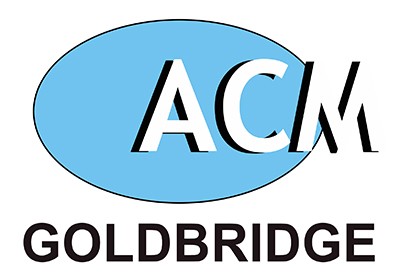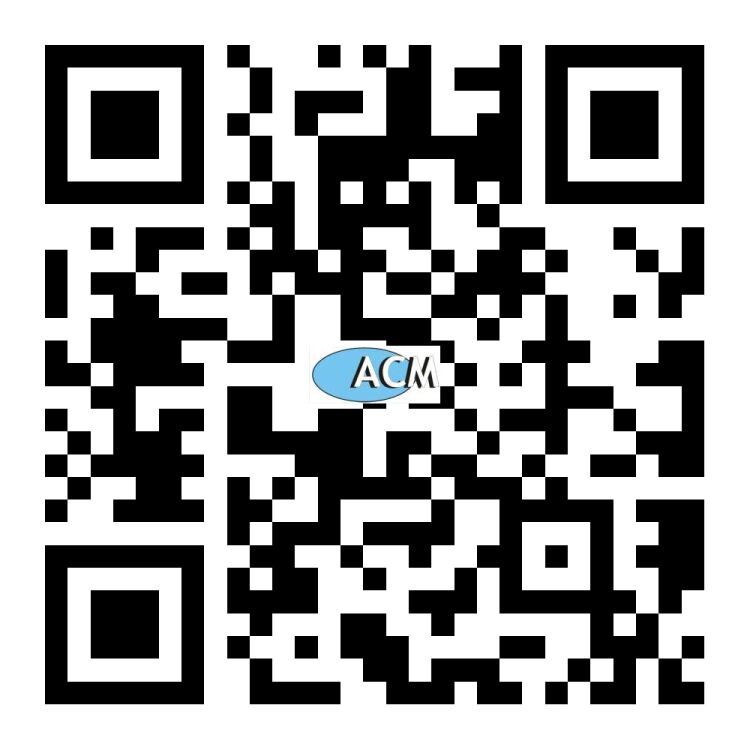NFC and HF RFID technologies help protect vaccine delivery and apply to verifiable vaccination certi

How labels work
NFC and HF RFID tags can be affixed to the transport packaging box or pallet that carries the vaccine bottle. When the plastic button is embedded, it can be affixed to the seal of the actual vaccine bottle, so that the goods can be tracked and the place of production can be verified. Both NFC and HF RFID operate on the 13.56 MHz frequency band, but support different standards and read ranges to be used in a variety of fields. The reading range of the NFC tag is close to a few centimeters, and it can be read with a standard NFC smart phone. HF RFID tags allow the use of remote readers to achieve a nearby reading range of up to 1.5m, including compatibility with NFC phones.
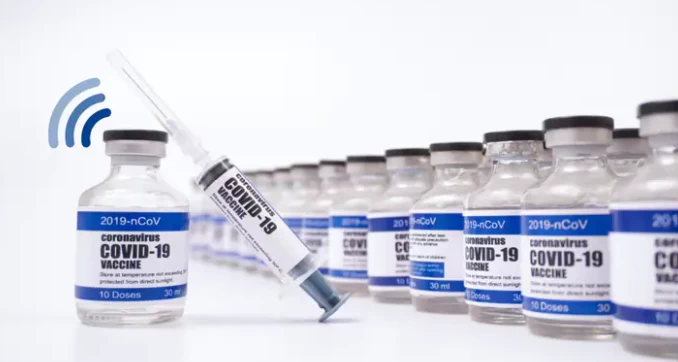
HF RFID &NFC for product and supply chain protection
For some time, high-demand, expensive drugs, such as antibiotics, anti-cancer drugs, vaccines, and antiviral drugs, have been common targets for counterfeiting, tampering, and gray market transfers.
Before the pandemic, the World Health Organization (WHO) and the Organization for Economic Cooperation and Development (OECD) estimated that about 10% of all medicines sold worldwide were counterfeit products. Europol found in its November 2020 report that the distribution of substandard and counterfeit medicines, including the COVID-19 vaccine, is still a consistent criminal activity related to the epidemic. These fake vaccines can be circulated on the illegal market and may be introduced into the legal market for sale.
HF RFID and NFC tags can help reduce the risk of counterfeiting and product transfer to unauthorized channels by achieving secure product identity verification at the box and item level, as well as improving traceability and accountability in the supply chain. Electronic tamper-proof seals and labels can be affixed to vaccine packages at the point of manufacture to prevent unauthorized opening. The label has its own unique ID, can be assigned to specific distributors and locations, and can report its source and intended destination at any point in the supply chain.
HF RFID tags based on ISO/IEC 15693 can reliably track, trace and verify vaccine products throughout the supply chain with project-level accuracy. The technology can also uniquely identify each item, even when multiple items pass the reading position at the same time (anti-collision), it can safely capture data without line of sight, making it easier and faster to transfer the goods Move to the correct position in the channel. This technology helps to detect the loss of inventory, determine whether the return originally came from a specific manufacturer, and helps prevent gray market shifts. And HF RFID can also track the batch number and expiration date of the goods.
NFC tags based on ISO/IEC 14443 and HF RFID tags using the NFC protocol can also support item-level authentication using mobile phones. At present, there are about 2 billion NFC smart phones in the world that are widely used. Due to the high popularity of NFC-enabled smartphones, this form of authentication does not incur any costs for special readers, and anyone who participates in the authentication process can perform it at any time. Just use a smart phone that supports NFC, just tap the NFC tag that appears on the phone screen, and government inspectors, warehouse workers, distributors, or healthcare providers can verify the authenticity of the product and view the whereabouts of the product or batch . Security label solutions, such as NXP NTAG DNA or ICODE DNA, have a built-in encryption function that can provide a high degree of protection against fraud attempts.
NFC secure processing
There is an increasing demand for tags with evidence of electronic tampering because they are designed to detect changes in the open state. This makes it easy to detect whether the shipping product packaging has been disturbed during transportation or storage. For example, NXP NTAG TagTamper tags include a conductive tamper loop that can detect opening and irreversibly record events when the tag is read. This feature helps to eliminate doubts about whether a particular package has been opened before arrival or use, and whether the vaccine inside has been diluted, refilled, or otherwise replaced the original vaccine.
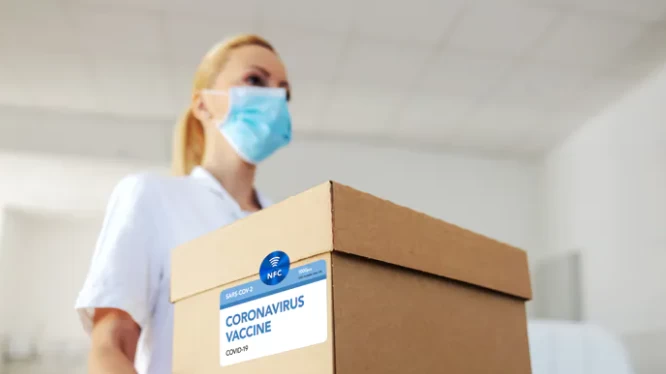
Many commonly used vaccines and drugs, including insulin, are sensitive to temperature. Therefore, they need to be kept within a given temperature range during transportation or storage, otherwise they cannot be used. The same is true for the COVID-19 vaccine, which needs to be kept below a certain temperature to ensure its efficacy.
The NFC tag equipped with temperature monitoring function can be used to track the storage environment of the vaccine and indicate whether the vaccine is exposed to an out-of-range temperature. NFC tags with the function of measuring and recording temperature are affixed to secondary packaging, such as shipping cartons, boxes, or pallets containing vials.
For example, NXP NTAG SmartSensor is a temperature logger that can operate from -40 to +85 °C and has a large non-volatile memory for recording temperature readings. The tag can act as a smart monitor, using a pre-programmed stability budget to indicate whether the vaccine has been stored correctly and is still safe to use. Security features can protect sensor data from outside manipulation, prevent false or damaged data from being uploaded, and prevent unauthorized access to stored temperature readings.
NFC verifiable vaccination certificate
A vaccination certificate is a document that proves that a person has been vaccinated with a specific viral or bacterial disease. It has been used for vaccination for nearly 100 years to prevent the restricted spread of diseases including yellow fever, measles and meningitis.
In response to the new coronavirus, COVID-19, governments and companies are considering vaccination certificates as a basis for reopening borders, resuming classroom learning and office work, and allowing people to gather in public places. However, paper certificates may be affected by fraudulent activities.
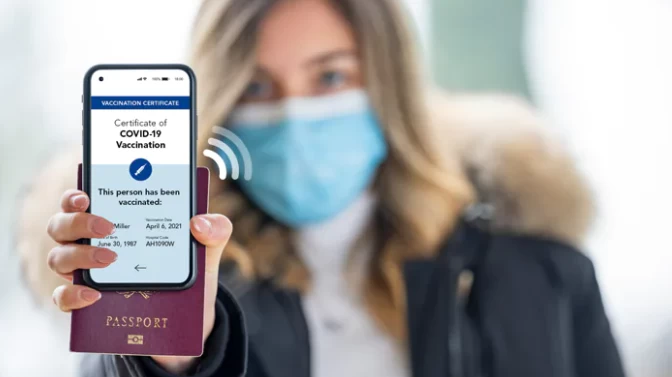
Contactless NFC tags are a safe and easy-to-deploy solution for issuing verifiable vaccination certificates. The NFC label can take the form of a sticker, which can be attached to an existing ID or vaccination card, or it can be issued as a separate COVID-19 vaccination card. Any smart phone that supports NFC can read these stickers, so it is easy to set the update status of vaccination through institutions such as hospitals or general practitioners. The inspector will verify the vaccination records associated with the proof of ownership, including any place where people need to prove their immunization status, including from border crossings, schools, offices to entertainment venues, sports events, hotels, etc.
NXP NTAG 424 DNA is a CC EAL-certified security chip with a personal identifier, key and enhanced privacy function. It is very suitable for use with verifiable vaccination documents because it is light every time you use a smartphone or other NFC device. Pressing will generate a unique, secure and privacy-protected transaction. Each time it is used, the encryption code based on the AES standard will change, so that each click can be individually authenticated. The technology also supports storing data on an additional security chip. The verifiable NFC vaccination certificate based on NXP DNA security technology provides three direct benefits: authenticity, privacy protection, and proof of ownership.
Pharmaceutical companies can complete the process of safe transportation through unique verifiable immunization stickers and the vaccines shipped with them, so doctors, clinics and hospitals will receive ready-to-use stickers and ready-to-use vaccines. After receiving the vaccine-related data (such as the date and place of vaccination and patient information), national health managers and pharmaceutical companies will be responsible for generating safety certificates. Medical professionals from the point of care can apply for such certificates and use smartphones equipped with mobile applications. After receiving the vaccine, the patient will also receive a vaccine certificate. Then, the inspector can tap the certificate using an NFC-enabled smartphone equipped with a validator app to check the authenticity of the vaccine and a person's immunity status. To help ensure that health certificates are up-to-date and comply with privacy requirements such as GDPR or HIPAA,
All vaccination details are digitized, encrypted, and associated with the identity of the patient, and it is guaranteed that any personal data will not be exposed.
in conclusion
As we begin to fight the COVID-19 pandemic through rapid vaccination around the world, pharmaceutical companies are playing an important role in protecting the supply chain and successfully providing ready-to-use immunizations. NFC and HF RFID tags can verify the authenticity of vaccines, report the status of transportation in real time, help ensure vaccine data processing and safe storage, and support the delivery of vaccines to patients in a safe and effective manner. At the same time, the NFC security label helps to confirm the status of people's vaccination, and the verifiable vaccination certificate can also report the status of vaccination safely and privately.
